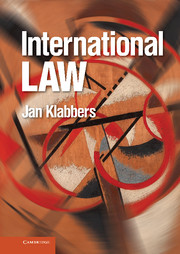Book contents
- Frontmatter
- Contents
- Detailed table of contents
- Table of cases
- Preface
- List of abbreviations
- Part I The structure of international law
- Part II The substance of international law
- 10 Use of force
- 11 The law of armed conflict
- 12 International criminal law
- 13 The seas, the air and outer space
- 14 Protecting the environment
- 15 The global economy
- Part III The surroundings of international law
- Bibliography
- Index
- References
12 - International criminal law
from Part II - The substance of international law
- Frontmatter
- Contents
- Detailed table of contents
- Table of cases
- Preface
- List of abbreviations
- Part I The structure of international law
- Part II The substance of international law
- 10 Use of force
- 11 The law of armed conflict
- 12 International criminal law
- 13 The seas, the air and outer space
- 14 Protecting the environment
- 15 The global economy
- Part III The surroundings of international law
- Bibliography
- Index
- References
Summary
INTRODUCTION
There are close connections between international humanitarian law and international criminal law. Perhaps the most obvious of these is the circumstance that war crimes trials have played a major role in the development of what is commonly referred to as international criminal law. Yet it seems useful and justifiable to treat the two bodies of law separately, for on the one hand, as the previous chapter has sought to show, humanitarian law covers more than war crimes, crimes against humanity, genocide and aggression, and international criminal law, by the same token, covers more than humanitarian law as well. Hence, the two branches overlap, but are not identical, and it cannot be said that one subsumes the other. What makes international criminal law particularly fascinating is that it assigns responsibility to individuals, and thereby breaks through the classic structure of international law.
The current chapter will address the role of the ICC and war crimes trials, but will also pay some attention to more ordinary forms of crimes with transboundary elements, and will discuss the forms of cooperation states have developed in combating crime. Even though the term ‘international criminal law’ is usually reserved for war crimes and the like, it should not be forgotten that there is a vast body of legal instruments dealing with international cooperation in combating other crimes. The chapter will also contain a discussion of the law of extradition, as the classic form of inter-state cooperation in criminal matters.
- Type
- Chapter
- Information
- International Law , pp. 219 - 233Publisher: Cambridge University PressPrint publication year: 2013



